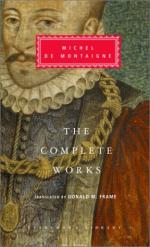
|
| Name: _________________________ | Period: ___________________ |
This test consists of 5 short answer questions, 10 short essay questions, and 1 (of 3) essay topics.
Short Answer Questions
1. What city did Guiseppe serve when Montaigne met him?
2. What holiday was Montaigne able to observe at Saint Peter's in Rome?
3. Montaigne's secretary notes near the end of Travel Journal: Chapter 13, that the region they are in was once controlled by what nation?
4. In Travel Journal: Chapter 13, Montaigne describes a priest who speaks what out-of-place language as part of his services?
5. Which of the following feudal ranks are counts and barons above?
Short Essay Questions
1. Describe the course of Montaigne's journey described in Travel Journal: Chapter 15.
2. What influences may have caused Montaigne to have a greater respect for women?
3. What is Montaigne's general perspective?
4. What are Montaigne's influences in his "Apology to Raymond Sebond"?
5. Why did Montaigne write his travel journals?
6. Why does Montaigne believe that women know more about love?
7. What church promotion occurred in Trent while Montaigne was there?
8. What does Montaigne admit about himself?
9. Overall, what is Montaigne's writing style like?
10. According to the note at the beginning of Book 3 of Essays: Chapter 12, why is the editor interested in Montaigne's travel journals?
Essay Topics
Write an essay for ONE of the following topics:
Essay Topic 1
Montaigne is interested in the subject of Christian apologetics (or apologists), the rational defense and explanation of the faith. He discusses Sebond's apologetic work at great length, and extends many supporting arguments for it in addition to his own original thesis.
1) Explain the subject of apologetics and its importance, according to Montaigne.
2) Summarize Montaigne's most important opinions and ideas on the subject of Christian apologetics.
3) Discuss the importance of this philosophical field in the context of the religious conflict of Montaigne's era.
Essay Topic 2
Montaigne believes in the reality of objective truth, ideas that exist in a perfect state, without the need for human interpretation. He believes that although he, and all other humans, are imperfect interpreters of these truths, they cannot be diminished or tarnished in any way by human failings.
1) Discuss the concept of truth that Montaigne articulates in his essays. How are truths understood and derived, and where do they come from? How do human beings interact with the truth?
2) Montaigne suggests that he may contradict himself from time to time. Discuss one example of this, and describe how Montaigne might explain his mistake. How would he justify the perfection of the truth he was attempting to express in the face of this contradiction?
3) Discuss the importance of the concept of objective truth in some of Montaigne's other philosophies. How does it relate to these other ideas, and how are his arguments bolstered by a reliance on objective truth?
Essay Topic 3
During his travels, Montaigne encounters a wide range of languages in colloquial use, reflecting the rapidly changing political landscape that results from the pressures and oddities of the feudal system.
1) Describe some of the unusual trends in language use that Montaigne witnessed during his travels. Which language stood out the most, and why?
2) Montaigne was somewhat disappointed to discover that foreigners often spoke with him in French. Describe the prominence of the French language in the countries that Montaigne visited and discuss the reasons for this phenomenon.
3) Relate the spread and persistence of foreign-language use to the feudal political system that dominated medieval Europe.
|
This section contains 760 words (approx. 3 pages at 300 words per page) |

|




